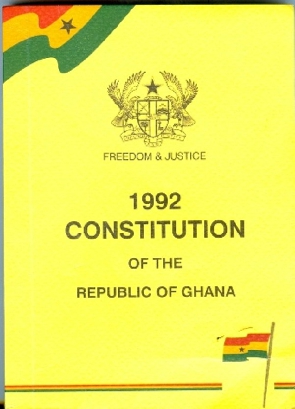I am the 1992 Constitution of the Republic of Ghana. My birthday is celebrated every 7th of January in Ghana. But my birthday has always been a bad day for me; it is always a day people choose to tell me how bad I am, even though I have always thought of birthdays as days to make merry in the midst of best wishes and compliments.
I have always been blamed for corruption and the slow pace of development in the country. Some even say inherent in me are dictatorship provisions to please my framers.
Most people have made calls for me to be "sentenced to death" with a call for a fresh Constitution. Some have called for some of my provisions to be amended.
However, before I am convicted and sentenced to death, reviewed or amended, I need to have my say just as I have had enshrined in me the provision for fair trial and the right to be heard in Article 19. You need to hear my side of the story because those asking for my crucifixion mostly do not tell you the whole story of how wholly beautiful I am even though I am not perfect.
But after every discussion, the question that keeps baffling my mind is, if it is all about development, is a perfect constitution really a panacea for development? Would a perfect constitution curb corruption? If so, then what about countries that are developed without a constitution or a written constitution with very few pages?
I am of the belief that even though I am not perfect as you all will want me to be, I have covered almost every aspect of your national life necessary to bring relative peace and tranquility as well as the promotion of tenets of democracy for all citizens of Ghana.
In most of the discussions, analysts and pundits have accused me of how I am badly drafted by looking at just one or two provisions. They fail to appreciate the fact that, in order to understand me, I need to be read wholly.
Secondly, they also need to appreciate the fact that, I cannot accomplish my task alone without a society of good men with standard morality.
I am only a written document to which public officers need to subject their actions, enforcement, and interpretation or are in the hands of citizens.
I expect public officers to do these things right in my spirit to complement my letters and you will see how beautiful I am.
Enshrined in me by my framers in Article 41 under the Directive Principles of State Policy in Chapter 6. Under the provisions of this Article are the duties expected of all citizens to give meaning to my letters.
I can only guess how many citizens have even looked at them as a guide. it is my belief that, as citizens, when you adhere to these duties in the performance of your obligations at various levels of society, you will promote and experience the sanity of the kind of society you desire. To promote development through me, I will need not just the good moral character of leaders, but also strong men, who will work to bring about stronger institutions to complement my role to bring the needed peace and development.
I will address just two points for which I have been criticized and will come back on the next Constitution Day to address the rest.
First, I have largely been blamed for the payment of ex-gratia and the further claim that I have given too much appointing powers to the head of the Executive I created.
Most Ghanaians do not spare one phrase anytime a discussion on the review of the constitution comes up, it is all about "Article 71", and by extension, the payment of ex-gratia to Article 71 officeholders. That is one thing most Ghanaians do not want to hear. But how am I to be blamed for that?
Let's see what is in Article 71 of the 1992 Constitution: Article 71 deals with the determination of certain emoluments of officers and public servants appointed by the President. Article 70 of 1992 is the institution created by the constitution. Generally, there are written processes laid down in determining the salary of even the very least public servant. T
Therefore, a laid down procedure for the determination of Article 71 office holders, as we popularly call them, should not be an exception.
However, the exception is that they belong to offices that are created by me and in my opinion, it will be proper if I should be the same authority to prescribe a procedure in the determination of their emoluments.
The substance of this Article states that the emoluments of those appointed by the President in Article 70 shall be determined by the President based on the recommendations of a committee of 5 members appointed by the President, whilst the emoluments of the President, Vice President, Ministers, Deputy Ministers and Members of the Council of State shall be determined by Parliament based on the recommendations from the same committee appointed by the President.
The same Article interprets salaries to include allowances, facilities, privileges, and retirement benefits. It is the retiring benefits that have come to be commonly known as ex-gratia. I am of the belief that retiring benefits are not alien in the sphere of the working life of all citizens and Article 71 holders should not be an exception.
However, the complaint is mainly about the quantum, the fact that it has to be paid every four years even to Parliamentarians when they are still in parliament and Presidents, etc. as they continue to stay in office. It is a right that retirement benefits are paid to those retiring.
When men and women who are citizens of the country have decided to take such decisions with regard to quantum and pay officers who retain their seats in Parliament and office every four years, how am I supposed to be blamed for this?
Let the record be set straight to the layman: I have not asked public officers to be paid ex-grati every four years nor have I determined the quantum to be paid as retirement benefits. I left that responsibility in the hands of you, the citizens.
Why the blame when I have, in Chapter 6, laid down the duties of citizens to guide the committee responsible for the determination of these emoluments?
With the provisions in Article 41 of the 1992 Constitution, I expect the committee to make its determination in a way that protects public property and purse and guards against misuse of public funds and property.
Why then blame me if in your opinion you think ex-gratia is a waste of public funds when I have laid down provisions that should guide citizens in such determinations? My work with regard to this issue was neatly drafted, the rest is for the citizens to determine.
Another argument in favor of calls for my death is that I have alloted too many appointing powers to the President as the head of the Executive. The sad thing is I do not really hear the same critics preferring alternative suggestions to such appointing authorities.
I agree with that fact, but I have also been searching for alternatives for myself as the critics have not gotten one yet. The question that beckons is: If I do not give such powers to the President to appoint IGP, who should? If the President does not appoint judges to the superior courts, who should? If the President does not appoint such officers as the Chief Justice, Electoral Commissioners, etc, who should?
Until we get answers to these questions and find alternatives to the current appointing powers, even if the current situation is the worst form, it still remains the best. Ultimately if the President does not appoint, the responsibility will lie with someone else. And loyalty will still be accorded to that appointing authority until citizens learn to subject their actions to the constitution and to the welfare of other citizens for the benefit of the entire country.
Yes, I have given the President appointing powers that may be said to be extensive; however, I expect the actions of those officers to be subjected to me as the Grand Norm of the land.
In the exercise of powers of public officials, I was mindful of the words of Lord Acton:_*" *_Power corrupts and absolute power corrupts absolutely"*_ I, therefore, expect public servants to be guided by Article 296 as enshrined in me. I provided that;
where in this Constitution or in any other law discretionary power is vested in any person or authority:
a) That discretionary power shall be deemed to imply a duty to be fair and candid;
b) the exercise of the discretionary power shall not be arbitrary, capricious, or biased either by resentment, prejudice, or personal dislike and shall be in accordance with due process of law.
I did not rest there but went further to devote the whole of Chapter 24 to dealing with the Code of Public Officers. Notable among the provisions under this chapter is Article 284 on Conflict of Interest.
This provision mandates a public officer not put himself in a position where his personal interest conflicts or is likely to conflict with the performance of the functions of his office.
This is how I expected the powers of public officers to be exercised; whether they are public officers appointed under the authority of the President or not. The substance of conduct of public officers, in my opinion, should not be about who appointed them but whether or not they are acting in a way I expect them to act as the Grand Norm.
If such officers are not acting in accordance with the law, I gave powers to the citizens to check them to remedy the situation. In Article 23, I enjoin Administrative bodies to act fairly and according to law and further states that persons aggrieved by such acts and decisions of administrative bodies shall have the right to seek redress before a court or other tribunal.
The ultimate power I granted to citizens to check the abuse of powers of public officers is in Article 2(1) of the 1992 Constitution where every citizen has the power to bring an action at the Supreme Court to declare null and void any act or enactment inconsistent with the constitution.
I am not as bad as people make me look. I will not resist amendments as, by my nature, I am liberal and a living organism capable of growth; I cannot deal with all issues in black and white; without amendment, my provisions that are not clear or which fail to meet modern trends can always be a subject of interpretation at the Supreme Court in an attempt to bring modifications to them to suit the changing society. Perhaps when you read me as a whole, you will notice how beautiful I am.
Opinions of Monday, 9 January 2023
Columnist: Francis Doeglah



















